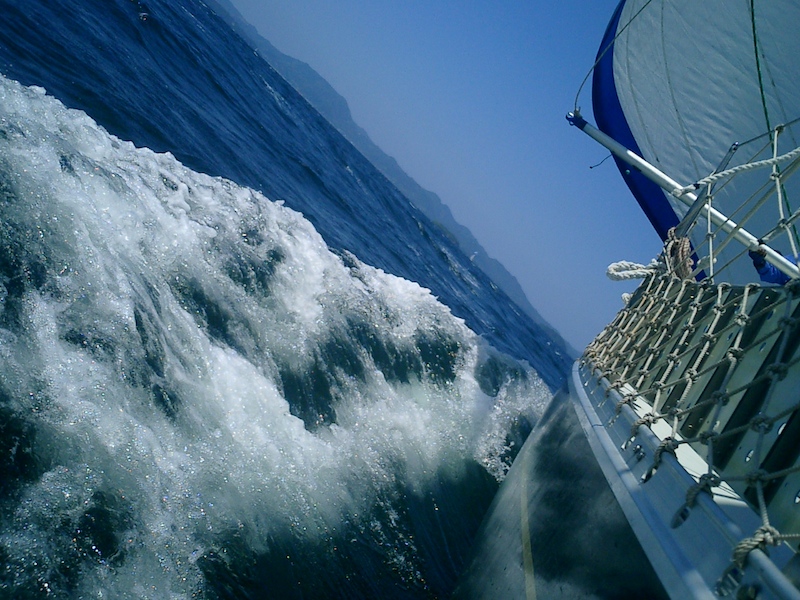While our passengers usually do not experience seasickness, many of our guest’s number one fear before cruising is becoming seasick on a small boat. Seasickness is the reaction of your body’s inner ear balance system to the unfamiliar motion of the ship. The ships movement can cause stress on your balance system which leaves you sick to your stomach, with headaches and feeling the worst you’ve felt in awhile (which is why we want you to avoid seasickness for your next cruise).
Understanding that you aren’t really sick, just out of balance, is the first step to curing yourself.
Seasickness typically goes away on its own after a few days as the body’s brain adjusts to the new movement and environment. But what about those first few days? If you’ve ever experienced it – it can be daunting and enough to scare you off from booking your next cruise.
Sea sickness can affect anyone, but at least for me, the pros of cruising far outweigh the risk of becoming seasick.

Tips on how to Avoid Seasickness
Instead of avoiding the sea, I do my best to prepare for a successful week on the water.
Get fresh air
Fresh air, a breeze and lack of enclosed spaces, can help out a lot with seasickness. Lay down, close your eyes and listen to some music on the deck. You want to get your mind off being sick and let the music calm you down. Since anxiety contributes to seasickness, you are more likely to get sick if you board your cruise expecting to feel sick. Plan ahead to reduce your stress, boarding your cruise confident and optimistic!
Keep the horizon in sight
You want to continually glance at the horizon, keeping it in sight, but not staring at it. As your body adjusts to the new movements, use the horizon as your point of reference. For most people facing forward on the boat vs. to the side helps manage their seasickness.
If you can’t look at the horizon, keep your eyes closed. This will reduce the conflicting signals between your eyes and inner ear.
Don’t use binoculars, cameras or read for an extensive length of time
Avoid staring at things that your brain would usually consider stable, this will only make your symptoms worse.
Manage your diet
Leading up to your cruise, eat ‘safe’ foods that you know your body can handle. Avoid anything overly spicy, acidic or fatty and try not to overeat or overdo it on the alcohol before you board the boat. Eat lighter meals and add peppermint and ginger to your diet, they are great natural remedies to help reduce the risk of seasickness.
Stay out of direct sun
You want to avoid your body overheating, so stay out of direct sunlight and continually sip water to stay hydrated. As you get closer to the equator, the sun gets stronger and if you aren’t keeping liquids in you, dehydration can bring on symptoms of seasickness
Avoid strong smells
If you happen to be near a guest that used a bit too much perfume, or near the exhaust from the engine move so that you avoid all strong smells that can make your nausea worse. This is where the fresh air can help clear up any intense smells that are lingering.
Bring medicine
Talk to your doctor before your cruise and come prepared with medicine they recommend to help you manage your seasickness. Dramamine and Bonine are the most common remedies our guests bring with them, they are available over-the-counter and are recommended to take 24 hours before your trip. The medicine is much more effective if it’s already in your bloodstream.
PSI bands
These are adjustable wristbands that apply acupressure to help relieve the symptoms of nausea and vomiting. While some people swear by them, some claim they don’t work as well. Find what works best for your body, but come prepared to try out a few of these different strategies.
Transderm Scop Patch
The patch helps prevent nausea and vomiting from motion sickness with minimal side effects, but it does need a prescription. You simply apply the patch behind your ear and it will last for up to three days. As with any medication, we suggest you talk to your doctor first.
What happens if you do get seasick?
Don’t be embarrassed, you aren’t the first and you won’t be the last!
If you feel the urge to get sick, find the closest trash can or ask a crew member where to go. Don’t try to hold it in, it will only prolong the inevitable. Usually it takes a few hours, sometimes a day or two, but almost everyone eventually gets their sea legs under them!




